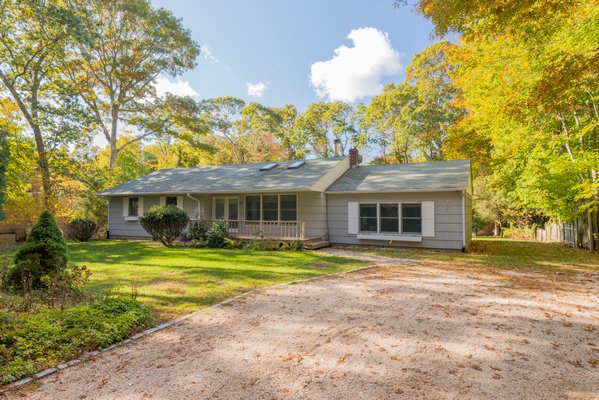
There is nothing imaginary about Philipp Preuss’s slice of heaven—a 1,754-square-foot bungalow in Southampton just steps away from a picturesque, private dock on Big Fresh Pond.
He can see it. He can touch it. He can even smell it. The property itself is tangible.
But the money he will accept for it is not.
An alternative to an asking price of $799,000, a buyer can now pay Mr. Preuss an equivalent 958.7 Bitcoins—the digital currency of an online financial network that is gaining footing on an international scale while, simultaneously, dividing economists into two camps: supporters and skeptics of the increasingly popular but controversial virtual money.
According to experts, the Bitcoin system is a way to use math and the internet to move money around almost anonymously, but there are a number of differing exchanges that are highly volatile. For example, between June and October 2011, one Bitcoin lost more than 90 percent of its value before shooting back up to the $832 it’s worth today—a value that is only temporary.
With that comes an uneasy stability. But Mr. Preuss—a 42-year-old, German-born investor who sells stocks for United Kingdom-based brokerage and advisory house Peel Hunt—says he is completely comfortable.
“I realize I’m early, and I’m not saying that Bitcoin will take over the world and take over the dollar,” he said last week from his office in Manhattan. “It will coexist between the dollar and Euro and Yen. Not everybody gets it right away. I do see myself as a trend-setter, yes. I like to think so—in Bitcoins, definitely. I’m happy to take calculated risks if I believe in something. And I do believe in Bitcoin. Most people I meet in their 20s are with me.”
Mr. Preuss first heard about the Bitcoin system in May when Union Square Ventures invested “smart money” in Coinbase, a digital wallet for the virtual currency, he said, adding that he thought, “These guys must know something that I don’t know.”
He began his research and, not before long, he was a “big fan.”
“Bitcoin makes a lot of sense because it’s very easy to transact,” Mr. Preuss explained. “You’re shutting out the bank, which is something I love because I feel like the banks have been nickeling and diming me all my life.”
He laughed, and mused, “Maybe that’s my reason. Because I want to get back at the banks.”
At its core, Bitcoin is a decentralized, peer-to-peer payment network that is powered by its users with no central authority or middleman. No one owns or controls the Bitcoin network—much like the technology behind email. It is controlled by all Bitcoin users around the world, hundreds of computers all over the Internet working together to process Bitcoin transactions—which can be completed in as little as 15 minutes, no matter the price tag attached.
Bitcoin value is determined by supply and demand. Prices are high when there is a demand. And when it falls, prices fall. There are a limited number of Bitcoins in circulation—only 21 million Bitcoins will ever exist—and new Bitcoins are created at a predictable and decreasing rate, which means that demand must follow this level of inflation to keep the price stable.
Because Bitcoin is still a relatively small market compared to what it could be, it doesn’t take significant amounts of money to move the market price up or down, making Bitcoin prices very erratic. In April, Bitcoin lost nearly half of its value in a mere six hours, crashing from an equivalent of $260 to $130.
Still, one month ago, Mr. Preuss decided to expand his buyer pool by offering them an option to close on his house in Bitcoins under the jurisdiction of Brown Harris Stevens of the Hamptons—the first East End agency to have an exclusive to sell that will accept Bitcoins, according to listing agent Amadeus Ehrhardt.
He said that his initial reaction was, “Interesting, let’s do it. Why not?”
“This homeowner is willing to accept either U.S. dollar or Bitcoin, so if anything, he expanded his potential buyer base,” Mr. Ehrhardt wrote in an email last week. “I think in our ever-changing world, anything that makes transactions simpler and faster will be in demand. In the short term, I don’t think it will change anything. In the long term, we will see. No one used PayPal 15 years ago.”
However, the timeless real estate model of taking clients from house to house will continue to thrive, he explained, as no computer or software program can give a buyer a sense for a home or neighborhood. Commissions, however, may see a change.
“You are the first one to ask this,” Mr. Ehrhardt said. “[It is] too early to tell. I’m sure there is a percentage of agents that are knowledgeable in regards to Bitcoin and would be happy to accept their commission that way.”
Several other real estate agencies in the Hamptons declined comment last week.
On Thursday, Overstock.com announced that it would accept payments in Bitcoin, making it the first major online retailer to embrace the virtual currency. Last week, Brooklyn-based businessman Willard Ling announced that he is planning on introducing the first Bitcoin ATM in Manhattan.
“I knew I had to familiarize myself with Bitcoin,” Mr. Preuss said. “And I’m glad I did. This is the future.”
To date, Mr. Preuss, who lives full-time in Connecticut, has not received any offers for his Southampton home in either U.S. dollars or Bitcoin. But he remains optimistic and hopes to sell in the spring. If using Bitcoin, he would use the exchange rate of the closing date, and maybe even offer a discount.
“I will be sad to see it go,” he said of his second home. “Big Fresh Pond is one of the most beautiful places in the Hamptons. The lake, that’s what got me there. I just love it out there.”